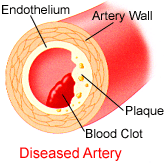 *1
*1Patients who experience angina pectoris that is unmanageable through medications or other interventions ie: coronary artery angioplasty.
Angina pectoris is a condition caused by lack of oxygen to the heart. The signs and symptoms vary. Typically they include but are not exclusive to:
- a tight band like or crushing feeling across the chest,
- a burning or stabbing feeling mid chest or in the back,
- a numbness that travels down one or both arms,
- indigestion unrelieved by ant-acids
- shortness of breath
- jaw pain
Angina is very specific to the individual. Women in particular do not often have the "classic" angina symptoms.
 *1
*1
The above mentioned symptoms of angina are caused by a lack of oxygen to the heart muscle. The muscle then "calls out" through the stabbing pain or shortness of breath etc. to let the person know it is not getting what it requires. These symptoms notify the individual to stop what they are doing, rest and take a spray of nitroglycerin.
Nitroglycerin is the most common medication used to treat an angina attack. Nitroglycerin comes in a little spray bottle and is to be sprayed under the tongue when an attack occurs. Under the tongue is a very vascular area, meaning that there are many vessels located close to the surface and the drug can be very quickly absorbed.
Nitroglycerin works by dilating the blood vessels allowing the blood carrying oxygen to flow easier to the heart muscle.
What is Bypass Surgery? - Preparing
for the Surgery
Index
1) Texas Heart Institute website (http://www.tmc.edu/thi/cad.html)
Kim Lowry, April 1, 2002